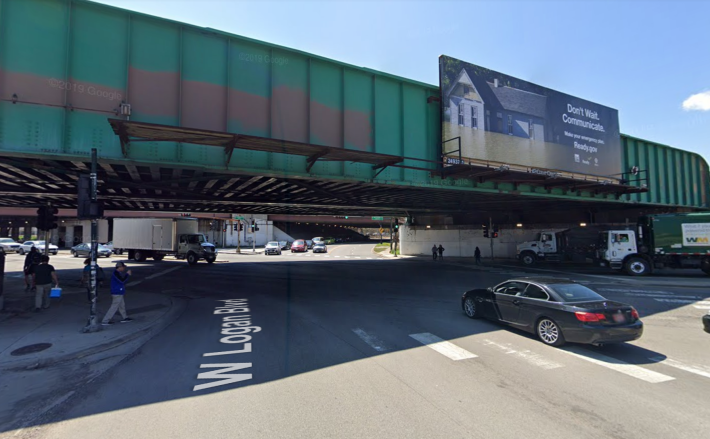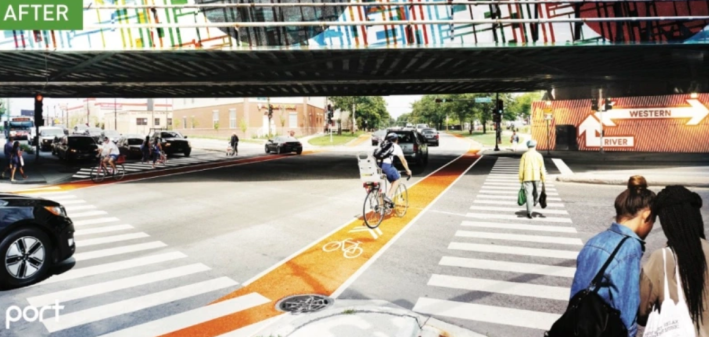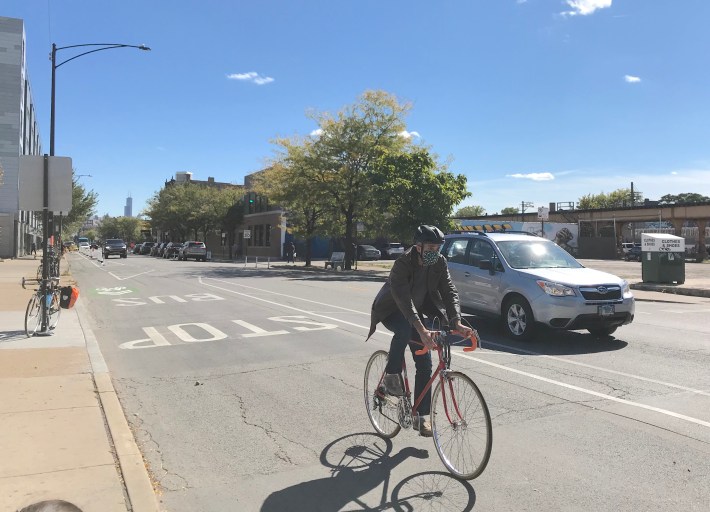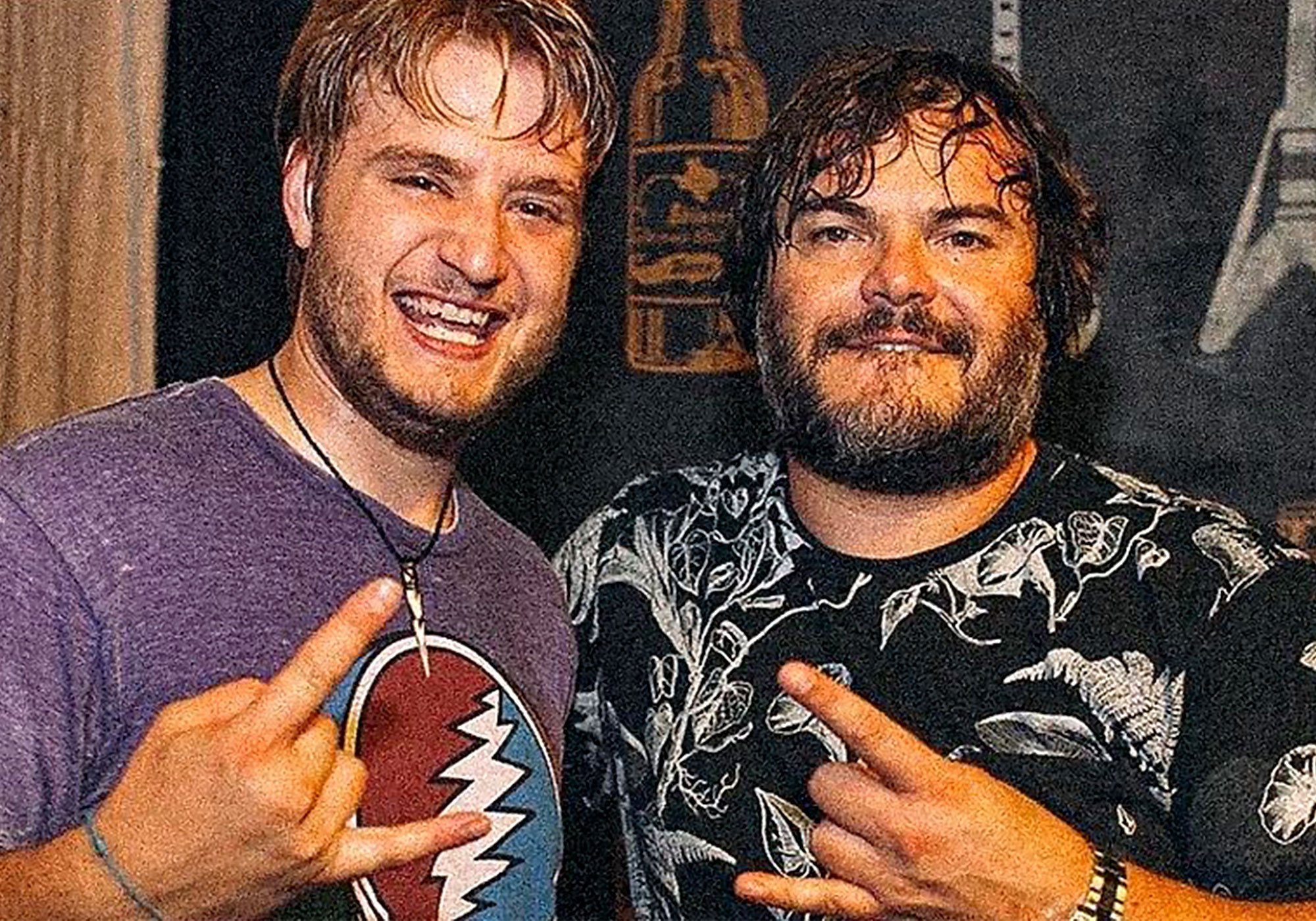Too many people have been killed while riding bikes through the complex intersection of Logan and Western avenues in Logan Square. It's located on an important cycling route between the Northwest Side neighborhood, Lakeview, and Lincoln Park, but it's the junction of two busy, multilane roads, further complicated by Kennedy Expressway access ramps, and the Interstate and the adjacent elevated Metra Union Pacific-Northwest line tracks darken the viaduct and obscure sight lines.

In 2008, a motorist struck and killed Tyler Fabeck, 22, on his bike there. About 13 years later, on May 26 of this year a 20-year-old driver fatally struck “School of Rock” drummer Kevin Clark, 32, while he was cycling east through the intersection. (While many other news outlets have noted that the southbound motorist allegedly had a green light, none have reported the fact that she was cited for refusing to take a DUI test, driving too fast for conditions, and driving uninsured.)
Although the Active Transportation Alliance released recommendations for safety improvements to the the intersection in 2018, such as eliminating a travel lane for a short segment, new bike lanes and crosswalks, and better lighting. However, the Chicago and Illinois transportation departments have taken no action.

Clark's family, ATA, and Chicago Ride of Silence will be holding a vigil on Saturday, June 12, at 10 a.m. at Logan Square's Centennial Monument at Logan, Kedzie, and Milwaukee avenues to honor his life and call for bike safety improvements to the intersection, the neighborhood, and citywide. Attendees are encouraged to RSVP to the Facebook event.
Recently I spoke with local alderman Daniel LaSpata (1st) about the intersection safety issue. He said it's a very personal issue for him because he lives near Fullerton and Western avenues, and bikes through the Logan/Western junction several times a week on his way to the nearby Target store and Export Fitness gym. "It's always been dangerous, both for cyclists and pedestrians. It's a very ill-structured intersection."
LaSpata also had "the worst bike crash of my life" around 2012 a few blocks from the junction at Diversey and Logan avenues, where Logan heads southwest from Diversey at a roughly 45-degree angle. Heading west on Diversey, he was in the turn lane when a driver struck him from behind. "I went over the handlebars, and I very vividly remember the sounds of my bike flying through the air and landing next to me," he said. Luckily his injuries were limited to a sore hip, but his cycle was totaled.
LaSpata said he visited the junction twice with Chicago Department of Transportation Commissioner Gia Biagi prior to Clark's death. In early 2020, soon after Biagi started the job, they did a drive-through of the neighborhood and stopped at the junction. And in October of that year, following a nearby press event for new protected bike lanes on Milwaukee Avenue, they bicycled to the intersection with Active Transportation Alliance advocacy manager Alex Perez.

"On the visits, everyone acknowledged that it's a poorly designed intersection," LaSpata said. "The challenge is that it's under the jurisdiction of multiple agencies: CDOT, [the Illinois Department of Transportation], and Cook County. There's only so much we can do without their collaboration."
CDOT spokesperson Mike Claffey recently told Block Club Chicago the department will be conducting a “post-crash analysis” of Logan/Western to figure out what changes are required to improve safety.
The alderman said he recently reached out to Illinois state representative Will Guzzardi (39th) and state senator Christina Pacione-Zayas (20th). "Both have been exceptionally responsive, and want to make sure IDOT is brought to the table to make changes," LaSpata said.
"I don't claim to be a traffic engineer," LaSpata added. "But I think it's important to delineate the space [in the intersection] better, so that it's clear to people walking, biking, and driving how they should be using that space."
The alderman said he told CDOT when he meets the Clark family at Saturday's vigil, he wants to be able to give them a concrete timeline for near-term safety improvements that will be made this summer, as well as a schedule for when long-range upgrades will be completed. "That's what people are demanding of us."
That is if LaSpata has a chance to talk to the family. "When you've experienced a deep trauma, sometimes an elected official is the last person you want to speak with, he said. But if they want to talk, I will have the greatest empathy for them, because I myself could be in the position that Kevin was... Every time a cyclist dies in Chicago we're told that in some sense it was their fault, and I'm really tired of it."






